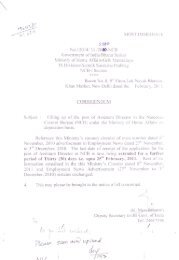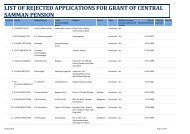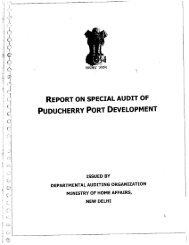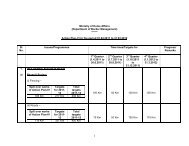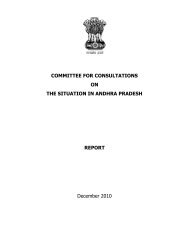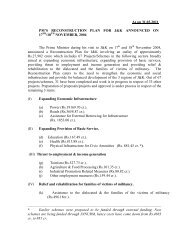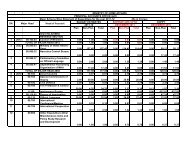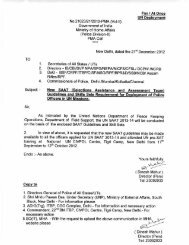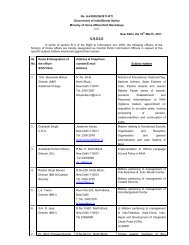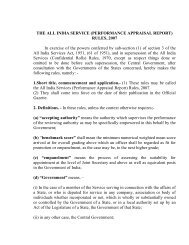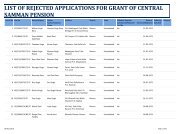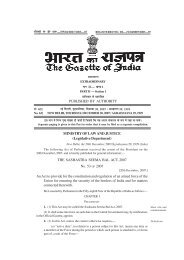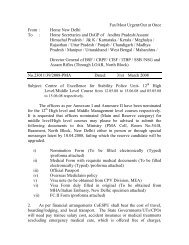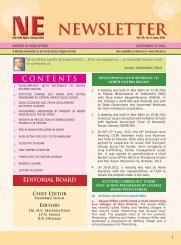Dr. Justice V.S. Malimath Report First pages - Ministry of Home Affairs
Dr. Justice V.S. Malimath Report First pages - Ministry of Home Affairs
Dr. Justice V.S. Malimath Report First pages - Ministry of Home Affairs
You also want an ePaper? Increase the reach of your titles
YUMPU automatically turns print PDFs into web optimized ePapers that Google loves.
146<br />
final order under S.373 or 374(3), “a brief statement <strong>of</strong> the reasons for the<br />
decision” shall also be recorded. The procedure that Metropolitan Magistrates<br />
can follow under S.355 is akin to summary procedure.<br />
10.5 Sub-Section (2) <strong>of</strong> S.260, provides that if in the course <strong>of</strong> the<br />
summary trial, it appears to the Magistrate that the nature <strong>of</strong> the case is such that<br />
it is undesirable to try it summarily, he shall recall any witnesses who may have<br />
been examined and proceed to re-hear the case in the manner provided by the<br />
Code.<br />
10.6 The procedure for recording evidence varies according to the form<br />
<strong>of</strong> trial. Section 274 Cr.P.C., prescribes that in summons cases and inquiries,<br />
“the Magistrate shall, as the examination <strong>of</strong> each witness proceeds, make a<br />
memorandum <strong>of</strong> the substance <strong>of</strong> the evidence in the language <strong>of</strong> the Court”.<br />
The proviso enables the Magistrate to cause such memorandum to be made in<br />
writing or from his dictation in open Court” where the Magistrate is unable to<br />
make such memorandum himself and records reasons for his inability.<br />
10.7 S.376 (d)., provides that no appeal from a convicted person shall<br />
lie when a sentence <strong>of</strong> fine only is passed not exceeding Rs.200/- in a case tried<br />
summarily by the Magistrate empowered under section 260.<br />
10.8 But it is a matter <strong>of</strong> lament that in response to the Question<br />
No.10.21 in the Questionnaire issued by the Committee, it has been brought out<br />
that S.260 and 355 are either unutilized or under-utilized.<br />
10.9 Only those Magistrates (Other than CJMs and MMs) who are duly<br />
empowered, either by name, or by virtue <strong>of</strong> <strong>of</strong>fice, or under the statute creating<br />
the <strong>of</strong>fence can try the cases summarily. But most <strong>of</strong> the Magistrates are not<br />
empowered. This is one among the many reasons why summary procedures is<br />
not fully utilized. As the Judge <strong>of</strong> the same status can deal with the case<br />
summarily when he is posted as a metropolitan Judge without any<br />
empowerment there is no reason why such empowerment is needed for other<br />
magistrates to deal with the cases summarily under Section 262 <strong>of</strong> the Code<br />
10.10 Under Section 262 the maximum punishment that can be imposed<br />
is 3 months. Under the negotiable instruments Act, Prevention <strong>of</strong> food<br />
adulteration Act, the <strong>of</strong>fences can be tried summarily under S.262 for which<br />
imprisonment <strong>of</strong> one year can be imposed as a sentence. The Judge <strong>of</strong> the same<br />
status sitting as Metropolitan Magistrate following the procedures similar to<br />
summary procedure prescribed by S.355 can impose a sentence up to three years<br />
imprisonment. There is therefore clear justification to enhance the limit



